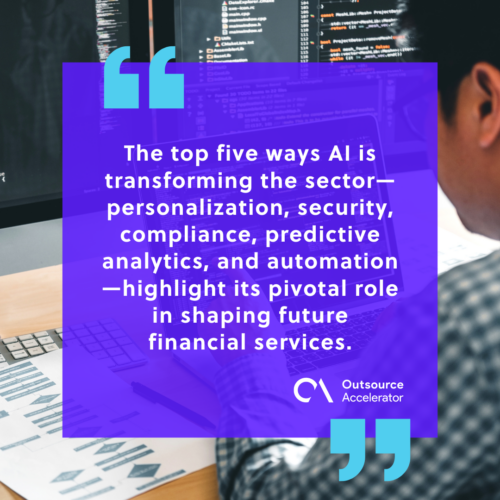5 ways artificial intelligence is changing the FinTech industry in 2024

This article is a submission by Innowise. Innowise is a software development and IT consulting company founded in 2007 that helps organizations achieve goals with digital solutions and recent technologies.
The FinTech industry is at the forefront of technological innovation, leveraging cutting-edge advancements to revolutionize how we manage finance.
As we step into 2024, Artificial Intelligence (AI) continues to play a pivotal role in shaping the financial services landscape. Partnering with an AI development company can further enhance AI’s transformative impact in FinTech.
This blog explores the top five ways AI is altering FinTech, detailing the benefits and envisioning the future of this synergy.
AI in FinTech: An overview
The integration of AI into FinTech results in numerous benefits, including:
- Increased efficiency
- Enhanced accuracy
- Reduced operational costs
AI-driven innovations not only streamline operations but also enhance customer experiences by offering tailored financial solutions and responsive service.
Moreover, the increased security measures foster a safer financial environment, building trust and compliance across stakeholders.
While AI offers immense potential in FinTech, it also presents challenges such as data privacy concerns, high implementation costs, and the need for sophisticated infrastructure.
There’s also a risk of bias in AI algorithms, which can lead to unfair decision-making processes. Addressing these issues is crucial for the sustainable integration of AI in financial services.
5 ways artificial intelligence is changing the FinTech industry
Here are five ways AI is altering the FinTech sector:
1. Enhanced personalization in customer service
AI’s integration into customer service is transforming how financial institutions interact with their customers.
Through machine learning algorithms and data analytics, AI systems can provide personalized advice and solutions tailored to individual financial behaviors and needs.
Chatbots and virtual assistants powered by AI handle routine inquiries with unprecedented efficiency, allowing human advisors to focus on more complex issues.
This shift not only optimizes operational efficiency but also significantly improves customer satisfaction and loyalty.
2. Robust fraud detection and security
In 2024, AI’s role in enhancing security measures within FinTech cannot be overstated.
AI systems are trained to detect patterns and anomalies that may indicate fraudulent activity, analyzing transactions in real-time. This capability allows for quicker responses to potential threats, substantially reducing the risk of financial losses.
Beyond transaction monitoring, AI-driven biometric verification methods, including facial recognition and fingerprint scanning, are becoming increasingly prevalent. They bolster security frameworks across digital platforms.
3. Streamlined regulatory compliance
Regulatory compliance is a major challenge in the financial sector. It involves vast amounts of data and requires meticulous adherence to legal standards.
AI simplifies this complex landscape by automating compliance tasks such as monitoring, reporting, and auditing. Advanced AI algorithms can sift through massive datasets to ensure compliance with regulations like:
- Know Your Customer (KYC)
- Anti-Money Laundering (AML)
This not only minimizes human error but also reduces the operational costs associated with regulatory adherence.
4. Advanced predictive analytics
AI’s predictive capabilities are a game changer in financial forecasting and risk assessment. Leveraging historical data, Artificial intelligence models can accurately forecast market trends and customer behavior.
Financial institutions utilize these insights to make informed decisions on product offerings, investment strategies, and risk management.
Moreover, AI-driven tools help identify new growth opportunities by analyzing market conditions and consumer preferences, thereby driving innovation and competitiveness in the sector.
5. Automation of financial processes
Automation, driven by AI, is reshaping how financial operations are conducted. From algorithmic trading to automated loan processing, AI technologies are enabling faster and more efficient financial processes.
For instance, AI can assess a borrower’s risk profile in a fraction of the time it takes traditional methods, significantly speeding up the loan approval process.
Similarly, in trading, AI algorithms can execute transactions at speeds and accuracies that are impossible for human traders, enhancing profitability and market stability.
Future of AI in FinTech
Looking ahead, the future of artificial intelligence in FinTech is poised for exponential growth. Continuous advancements in AI technology will likely unlock new potentials, further transforming financial services.
We can expect more sophisticated AI solutions that seamlessly integrate with human operations, offering even greater accuracy and efficiency.
The evolution of AI will continue to foster new business models and services, ultimately leading to a more inclusive financial ecosystem.
The integration of AI into financial software development is key to these advancements, enhancing the capabilities and reach of modern financial solutions.
Real-world cases of AI in FinTech
Artificial intelligence is reshaping the FinTech landscape, with several groundbreaking real-world applications demonstrating its potential.
Below are the top three cases where AI has made significant impacts:
JPMorgan Chase’s COIN Program
JPMorgan Chase has utilized AI through its Contract Intelligence (COIN) program, which automates the interpretation and analysis of legal documents.
Not only has it drastically cut down on the number of hours spent on document review, but it has also reduced errors associated with manual review.
This AI implementation showcases how machine learning can enhance efficiency and accuracy in complex legal compliance.
Ant Financial’s Credit Scoring System
Ant Financial, an affiliate of Alibaba, uses AI to revolutionize credit scoring and lending practices in China.
By analyzing over 1,000 data points, including online purchase history and social media behavior, Ant Financial’s AI system provides a comprehensive assessment of a borrower’s creditworthiness.
This allows for the extension of microloans to individuals and small businesses who traditionally lack access to banking services.
Kabbage’s Automated Lending
Kabbage, an online financial technology company, leverages AI to streamline the lending process for small businesses.
Kabbage can quickly determine loan amounts and offer lines of credit almost instantaneously by analyzing real-time data points from various sources, such as market trends and company performance.
This efficiency has significantly improved small enterprises’ access to capital, enhancing their ability to grow and scale quickly.
Zest AI’s Loan Approval Automation
Zest AI is transforming the way financial institutions handle loan approvals by using advanced artificial intelligence techniques to assess the risk associated with potential borrowers.
Their AI system analyzes traditional and non-traditional data sources, such as mobile phone usage and rent payment histories, to provide a more comprehensive risk assessment.
Lenders can offer loans to a broader spectrum of borrowers, including those who may have been overlooked by conventional credit scoring systems.
Zest AI’s approach not only expands financial inclusion but also helps lenders reduce defaults and improve loan performance.
Embracing artificial intelligence in FinTech
As we navigate through 2024, AI’s influence in the FinTech industry is undeniable.
The top five ways AI is transforming the sector—personalization, security, compliance, predictive analytics, and automation—highlight its pivotal role in shaping future financial services.
Embracing AI innovations will be crucial for FinTech companies aiming to stay competitive and meet the evolving demands of the digital economy.
The integration of AI not only promises enhanced operational efficiencies but also a redefined customer experience, setting the stage for a revolutionary approach to finance.









 Independent
Independent




